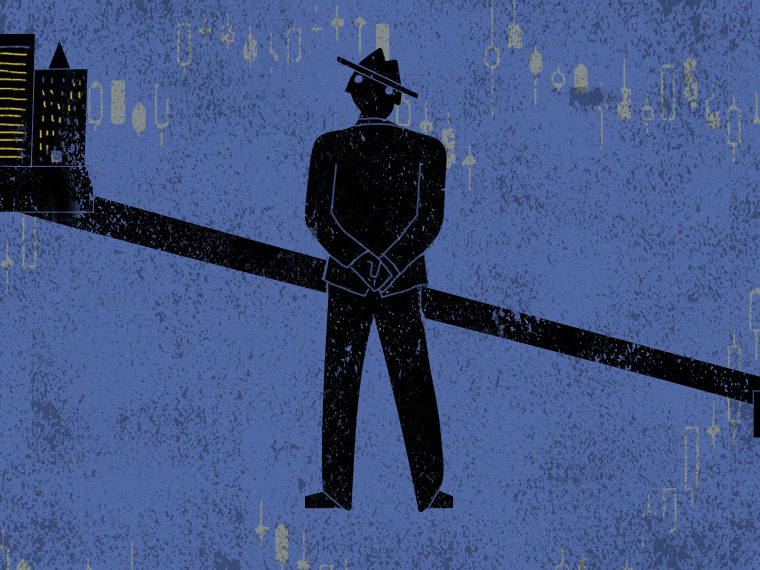Nico Voigtländer found that to combat arbitrary taxes and corruption, merchants persuaded the king to cede control
In England’s lore, the job of curbing the abuses of the Sheriff of Nottingham — and his excessive taxes — falls to the hero Robin Hood and his Merry Men. But new research suggests a more widespread and effective antidote to local corruption: a robust form of self-governance that helped lay the groundwork for democracy.
Through special agreements forged with the king, merchants gained control of local tax collection and law enforcement operations, bypassing the middlemen who were at the heart of a corrupt and inefficient economy. They then leveraged their position to get seats in Parliament, giving them a voice on important national issues, such as the funding of war.
This revealing look at an early form of self-governance is contained in a paper by Columbia University’s Charles Angelucci, University of Exeter’s Simone Meraglia and UCLA Anderson’s Nico Voigtländer, published in the working papers series of the National Bureau of Economic Research.
Opt In to the Review Monthly Email Update.
Their findings are based on an analysis of a digitized database of 550 medieval English boroughs, or market communities, after the Normans invaded England in the 11th century.
At the time, England was controlled by the king and lords who collected taxes on property, trade and other economic activity. The king appointed sheriffs responsible for collecting taxes and patrolling markets in the royal boroughs. The lords, whether lay or religious, usually policed their own territories, which were generally smaller than the king’s boroughs.
Urbanization brought a boom in commercial activity, and soon tolls and taxes became a primary part of the royal budget. But this dramatic increase in economic activity also encouraged abuse by the sheriffs and their followers, particularly when the king left the realm to fight wars or engage in crusades. Merchants frequently filed formal complaints about double collection of taxes, arbitrary fines and the extraction of unauthorized tolls. One abbey compared the local sheriff to “a ravening wolf, a cunning fox, a dirty pig and an impudent dog.”
To stave off widespread political unrest, the king and lords established a system of “mutually beneficial agreements” called Farm Grants. Borough officials paid a fee in exchange for the right to collect their taxes and enforce their laws. In some cases, locals even gained the right to ban royal officials from entering their villages.
Most of these grants went to boroughs controlled by the king. In 1348, for example, half of the 146 royal boroughs received Farm Grants as opposed to just 18, or 4.5 percent, of the 404 boroughs controlled by lords.
Removing the middleman proved beneficial for both parties. The king received an annual payment plus his share of taxes and didn’t have the headaches of policing the local economy. In exchange, the boroughs gained control over their tax system and law enforcement. This enabled them to collect taxes in a less arbitrary fashion and to curtail corruption.
In the beginning, the royal councils that served as advisors to the King were staffed by clergy, barons and knights. But after Parliament was established in 1295, its rolls were expanded to include merchants and burgesses (local officials). By 1348, villages with Farm Grants held about half of the 129 seats in Parliament. Of the 38 villages that had Farm Grants and restrictions on entry of royal officials, 87 percent had representation in Parliament.
Parliament did not meet regularly but was summoned by the king during times of necessity, such as when funds for war needed to be raised. Angelucci, Meraglia and Voigtländer believe the Farm Grants made the granting of political rights, or “enfranchisement,” more likely because it was harder for the king to impose extra taxes in boroughs that enjoyed self-governance. Being included in Parliament, these boroughs participated directly in negotiating “extra-ordinary” taxes to finance wars.
Participation in Parliament meetings not only gave local officials a venue for lobbying the king but also increased the likelihood that they would support issues of national importance such as the Civil War of 1642. By this point, the merchant class had a stake in keeping Parliament strong to provide a check on the king and protect their economic interests. Among the boroughs with Farm Grants, for example, 23 percent raised volunteer troops to support Parliament during the Civil War of 1642, compared with just 2 percent for all other boroughs.
This trend was still in evidence two centuries later when a review of voting rolls showed MPs who represented boroughs with Farm Grants were more likely to support the Great Reform Act of 1832, which is considered a milestone in the democratization of Parliament.
Angelucci, Meraglia and Voigtländer compare their latest findings to the experiences of France, Spain and southern Italy. Though the overall political environment was similar, they found that the existence of strong local or regional lords in those countries limited the amount of control the localities could exert over the monarchy.
England, in contrast, provided an interesting “reversal of power” in which an initially strong central power — the king — ended up ceding administrative power to local authorities that were eventually able to use it to their political advantage on the national stage.
Featured Faculty
-
Nico Voigtländer
Professor of Global Economics and Management
About the Research
Angelucci, C., Meraglia, S., & Voigtländer, N. (2017). The medieval roots of inclusive institutions: From the Norman conquest of England to the Great Reform Act. NBER working paper.






